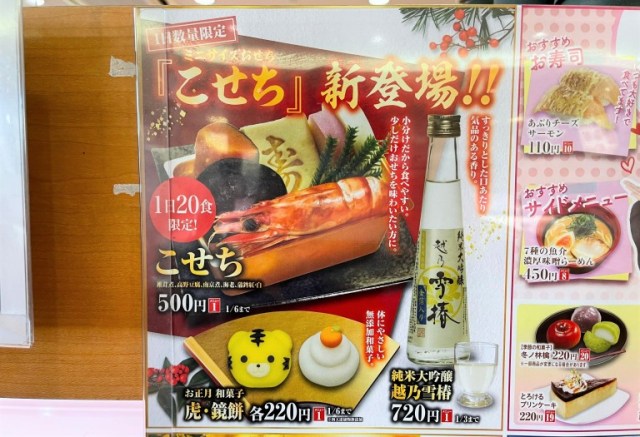
Conveyor belt sushi chain Kura Sushi single-sizes osechi, creates new desserts to keep us company.
Japan’s fond memories of fried chicken, the nation’s favorite fare for Christmas Eve, haven’t entirely faded yet, but it’s already time to start looking ahead to the next special seasonal meal, osechi…or then again, maybe it’s not.
See, osechi is a spread of elegant morsels eaten to celebrate New Year’s in Japan, each made with high-class ingredients and/or having some sort of special, auspicious symbolism. However, osechi tends to be both cost and time-intensive to cook, so usually it’s only worth making if you have a large family that’s coming together for New Year’s. As families in Japan become smaller and more spread out compared to those of their more agrarian ancestors, though, some people think it’s not worth the trouble to make osechi if they aren’t going to be eating it with their extended family, and making a single-person serving of osechi just for yourself is almost unheard of.
That’s where Kura Sushi enters the story. This year, the conveyor belt sushi restaurant chain is offering what it’s dubbed Kosechi, or “Small Osechi,” and our Japanese-language reporter K. Masami went to try some for herself as soon as it went on sale, December 27.
Like with the regular menu items at Kura Sushi, you order the Kosechi through your seat’s touchscreen panel. Since it comes down the same conveyor belt lane that’s designed for two-piece plates of sushi, the Kosechi container is remarkably compact, able to fit in the palm of your hand, but also kind of cute. Everything is laid out in an elegant and orderly arrangement, too, and Masami was impressed at the care that went into the small-scale presentation.
As for what’s included in the 500-yen (US$4.35) set, Masami started with the stewed shiitake, one of Japan’s prized gourmet mushroom varieties…
…then moved on to the stewed Ebisu kabocha Japanese pumpkin, named after the god of prosperity and said to be packed with nutrients to fend off winter colds.
Next she gobbled up the pieces of kamaboko fish sausage, in the lucky color combination or red and white, and the block of tofu with kotobuki (“happiness”) written on it in kanji, before turning her chopsticks towards the jumbo shrimp finale.
▼ Shrimp are part of osechi because their curved back is supposed to resemble the posture of a human senior citizen, with the idea being that eating the shrimp will grant you a long life.
Everything was nice and tasty, allowing Masami to get an early start on the relaxed, warm and fuzzy feeling associated with New Year’s in Japan. She did, however, feel just a little bit lonely, or perhaps it’d be better to call it homesick, since osechi is usually something you eat with your entire family, not by yourself. Obviously, the way to counter this melancholy was to assemble a surrogate family of desserts.
After a few more taps of the touchscreen, Masami had two sweet treats in front of her.
One of them looked just like a tiny little kagami mochi, a stack of two mochi rice cakes with an orange on top that’s set out as a New Year’s decoration. But remember, this is a dessert, so while it looks like kagami mochi, it’s actually anko, sweet bean paste, with a strawberry flavor.
And to finish off the meal, she also had an anko tiger (both desserts are priced at 220 yen).
This one doesn’t have any special flavor other than anko’s baseline one of sweet red beans, but if you’ve ever eaten Japanese sweets, you know that that’s really all you need to have your taste buds cry out in joy.
Kura Sushi’s Kosechi and New Year’s-themed sweets (the tiger is the Chinese zodiac animal for 2022) are on sale until January 6, so even if you are celebrating the first few days of the new year with a whole bunch of people, you’ve still got a chance to try out the solo-size osechi for yourself.
Photos ©SoraNews24
● Want to hear about SoraNews24’s latest articles as soon as they’re published? Follow us on Facebook and Twitter!
[ Read in Japanese ]